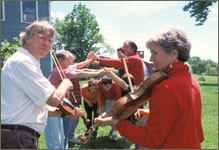Music & Dance Traditions – NH Traditions
"If you do things just right, then maybe you'll have a tune people want to dance to."
- Bob McQuillen

Dudley Laufman with his partner
Jacqueline Laufman, are "Two Fiddles."
Together they preserve traditional
social dancing of the working class –
what they sometimes call Country
Dancing or Barn Dancing.
This happy thought reveals the close connection between traditional music and dance in New Hampshire. This relationship is most visible at weekly contra and square dances held in town halls, grange buildings, and other community centers around the state.
Contra and square dancing can be traced to traditions introduced by the English colonists who settled New Hampshire in the 1620s. They brought many of their traditions with them including their music and dance. The English and Celtic musical forms-reels, jigs, and marches-were played for social dances enjoyed by both the rural and gentry classes. Today, fiddles, flutes, accordions, and pianos are used to play the same basic style of music for contra dancers.
Contra dances grew out of 18th century line dances. In colonial times, dance instructors went from town to town teaching the complicated movements of social dances. With the decline of dance instruction, dance callers became an important part of the tradition. Today, dance callers are valued for the instruction they give and the way their voices add to the musical experience. Many have become dance historians and continue to call the favorite "old chestnuts" as well as the newer dances. Some dance callers specialize in working with families and some call for the more seasoned dancers that have mastered complex movements.

Musicians Joe Pomerleau (front),
Wilson Langlois (right) and
Dan Daly (left) play
French-Canadian tunes
from Québec.
Another important part of the traditional soundscape in New Hampshire are the traditions brought to New Hampshire in the mid- to late 1800s by settlers from New Hampshire's northern neighbor, Québec. French Canadians came to New Hampshire originally to seek work in the lumber camps of the northern forest or the mill towns of the south. Making music and singing with family and dear friends was, and still is, done mostly in homes at parties called soirée.
French-Canadian traditional music is built around the fiddle and shares many of the same rhythms as Celtic music – jigs, reels, marches and German waltzes. The French style of playing has a distinctive bowing style and players embellish their melodies with extra notes called ornaments.
Over time people from various European countries have also settled in New Hampshire. Irish and Scottish music and dance traditions are important in various parts of the state. The Seacoast Irish Cultural Association promotes Irish musical heritage. There are several events to celebrate Scottish heritage including Highland Games. People of Polish ancestry enjoy folk songs and dances at community and church celebrations, usually during the holidays.
Adding to the musical mix in New Hampshire is the klezmer music enjoyed by the Jewish community. Church is often a stronghold for traditional music, and people of African-American descent in New Hampshire praise and pray within the gospel musical tradition that is shared with many other regions of the United States. Most recently, people of Hispanic ancestry have come to the state from Mexico, the Dominican Republic, Puerto Rico, and other countries.
Regardless of where they are from, people continue to find meaning and comfort in traditional music and dance, and make the effort to preserve it.
Many traditional musicians in New Hampshire have recordings available.
Photo credit: Lynn Martin Graton
![]() Portable Document Format (.pdf). Visit nh.gov for a list of free .pdf readers for a variety of operating systems.
Portable Document Format (.pdf). Visit nh.gov for a list of free .pdf readers for a variety of operating systems.
New Hampshire State Council on the Arts
19 Pillsbury Street - 1st Floor, Concord, NH 03301


